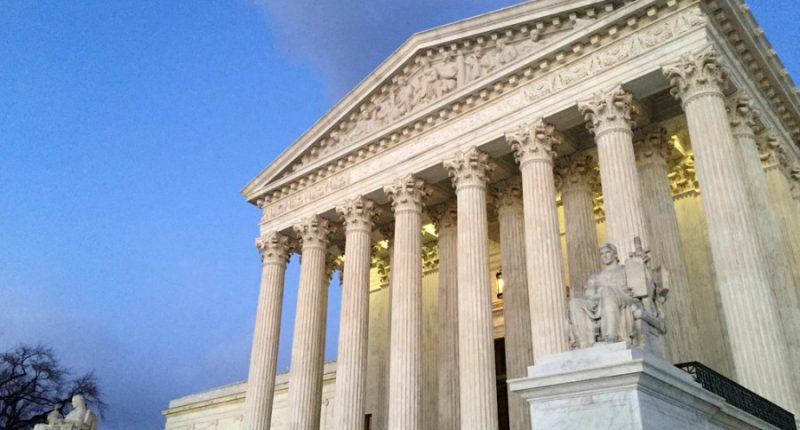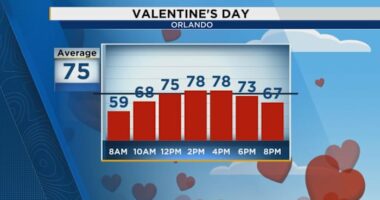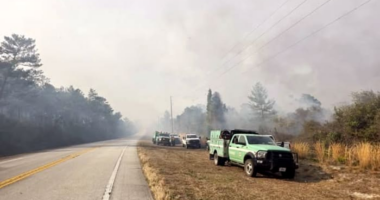Share this @internewscast.com

The Supreme Court is signaling fading confidence that the Trump administration will act in good faith in response to judicial decisions limiting its immigration agenda, a sign that the courts are growing as frustrated with President Trump as he is with them.
The dynamic came into focus as the Supreme Court mulled Trump’s birthright citizenship restrictions and swift deportation efforts, while lower courts have also expressed a creeping doubt that the government can be trusted to abide by their decisions.
The divide could become a test on whether judges will maintain their long-standing deference to the government’s representations in court. However, it’s not always clear-cut, as the justices proved Monday when they sided with Trump by allowing him to strip nearly 350,000 Venezuelans’ temporary legal protections.
Trump has charted an ambitious course to carry out his promised immigration agenda from attempting to redefine birthright citizenship to employing rarely used legal authorities for mass deportations that has fueled a barrage of litigation.
Perhaps most notably, he has looked to use the Alien Enemies Act of 1798, which permits swift deportations in certain circumstances.
Previously, presidents have only leveraged the law during declared wars. But it can also be invoked during an “invasion” or “predatory incursion,” which Trump claims enables him to quickly send to El Salvador the Venezuelans whom the administration alleges are members of the Tren de Aragua gang.
The Supreme Court has declined to resolve that question yet, but its emergency decisions so far reveal an apparent 7-2 split over whether to trust the government’s assurances.
The latest battle emerged after the American Civil Liberties Union (ACLU) flooded the courts over concerns that a group of migrants detained in Texas was being bused to the airport on April 18 to be immediately flown to El Salvador.
Government lawyers, however, insisted no flights were scheduled that evening. They also said no flights were scheduled for the following day, though the government would “reserve the right” to change that.
It wasn’t enough to fend off the Supreme Court. In a remarkable order issued in the middle of the night, the court blocked any flights until it could issue a ruling. That ruling landed Friday, providing the court’s most detailed thinking yet on its slipping faith.
“Evidence now in the record (although not all before us on April 18) suggests that the Government had in fact taken steps on the afternoon of April 18 toward removing detainees,” the majority opinion reads.
The opinion revealed a deepening divide among the court’s conservatives. Even Trump’s appointees seem unconvinced the government is good for its word, with only Justices Samuel Alito and Clarence Thomas publicly dissenting in favor of Trump.
The majority pushed back against Alito and Thomas in an unusually biting manner, writing they “reject” their characterization of the events on April 18.
Alito’s dissent, meanwhile, called the court’s opinion “misleading,” saying the migrants only had “sketchy evidence” about imminent removals and the majority “overstates” the Trump administration’s position.
“This theory rests on a mischaracterization of what happened in the District Court,” Alito wrote of his colleagues’ opinion.
As the Supreme Court declined to take up whether Trump can invoke the Alien Enemies Act in the first place, one justice had seen enough.
Justice Brett Kavanaugh, Trump’s second appointee, said the “circumstances call for a prompt and final resolution” and he didn’t want to put off settling what he called “the critical legal issues.” He voted to take up the case in full, immediately.
Trump responded to the order with some of his sharpest criticisms yet of the Supreme Court since taking office.
On Truth Social, he shared a post from Mike Davis, a rabble-rousing Trump adviser on judicial matters, suggesting the president should house the migrants near a country club within walking distance of Kavanaugh’s and Chief Justice John Roberts’s homes “with daytime release.”
“The Supreme Court of the United States is not allowing me to do what I was elected to do,” Trump wrote in another post.
It’s a notable shift from earlier in his term, when Trump took care to express his “great respect” for the Supreme Court even as he accosted lower district judges who were ruling against him in various cases.
Frustrations with the justices were already building before the court handed down its Alien Enemies Act decision, however.
A day earlier, concern over the government’s willingness to abide by the courts seeped into arguments stemming from Trump’s bid to narrow birthright citizenship.
Several justices tiptoed around the constitutional crisis that would arise from an administration refusing to yield to court orders or precedent as they weighed whether courts should be allowed to block the order nationwide or just for the people who challenged it in court, probing Solicitor General D. John Sauer on where the line falls.
Justice Elena Kagan pressed the administration’s chief legal representative over whether it would “commit” to following a federal circuit court order finding Trump’s birthright citizenship order unlawful. Sauer said that is “generally” the government’s practice, but there are “exceptions.”
“Yes, that is generally your practice,” Kagan said, “and I’m asking whether it would be your practice in this case.”
“I can’t answer because it would depend on what the lower court decision said,” Sauer replied, insisting some exceptions would let the president’s policies go into effect for people who haven’t sued.
Justice Amy Coney Barrett later asked Sauer if his contention was that the administration could disregard a circuit court’s precedent because it “might disagree with the opinion.”
“Is that this administration’s practice or a long-standing one?” Barrett asked.
“As I understand it, long-standing,” Sauer replied.
“Really?” Barrett pushed back.
The justices’ creeping concern comes as Trump’s limit on the high court’s rulings against him seems nearly reached. The morning after the argument, he suggested the justices were being swayed by outside forces.
“THE SUPREME COURT IS BEING PLAYED BY THE RADICAL LEFT LOSERS, WHO HAVE NO SUPPORT, THE PUBLIC HATES THEM, AND THEIR ONLY HOPE IS THE INTIMIDATION OF THE COURT, ITSELF. WE CAN’T LET THAT HAPPEN TO OUR COUNTRY!” Trump posted.
It hasn’t been all losses for Trump, however.
The justices on Monday greenlighted Trump’s bid to revoke nearly 350,000 Venezuelans’ Temporary Protected Status, lifting protections that bar deportation due to civil unrest and dangerous conditions in a migrant’s home country.
But even there, the justices showed caution. The order took care to explain that some of those migrants could still sue if the Trump administration revokes their extended work authorizations or other legal documents.
And battles continue to bubble up in the lower courts that could soon reach the justices, including in the case of Kilmar Abrego Garcia, the man mistakenly deported to El Salvador in March whom the administration accuses of being a gang member.
At a Friday hearing, U.S. District Judge Paula Xinis expressed concern that the administration wasn’t complying with the Supreme Court’s order to facilitate the man’s return.
Rep. Glenn Ivey, a Democrat who represents where Abrego Garcia lived in Maryland, said outside the courthouse that the administration’s “ultimate day” was coming.
“I think they’re going to have to put up or shut up, and I think we’re closer to that than we have been ever before,” he said.
An appointee of former President Obama, Xinis is set to soon rule on whether the administration can avoid handing over documents by asserting state secrets privilege remains ongoing, which could spark a new wave of appeals.
“I don’t see how you can make the point to me that this is some good faith effort to comply with the court’s order,” Xinis said.












